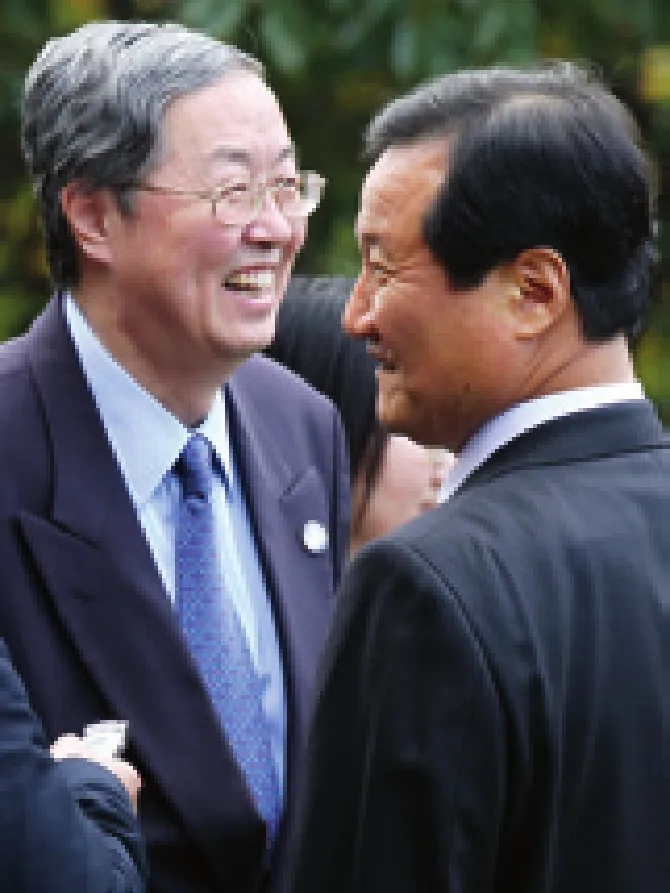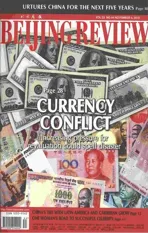Gaining a Bigger Say
2010-10-14ByDINGYING
By DING YING
Gaining a Bigger Say
By DING YING
The recent hike in China’s IMF quota means its international voice w ill increase

MORE EQUITABLE: IMF Managing Direc tor Dom inique Strauss-Kahn add resses the annua l m eeting o f the IMF and the Wo rld Bank in Washington, D.C. on Oc tober 8. The recent ag reem ent on a 6-percent quo ta shift w ill a llow deve lop ing coun tries to p lay a bigger ro le in the IMF
F inance m inisters and central bank governors from the Group of 20 (G20)major econom ies agreed on October 23 to shift more than 6 percent of the International Monetary Fund (IMF) quotas to emerging or underrepresented countries.According to the agreement, signed in Gyeongju in the Republic of Korea, China’s new quota in the IMF w ill be the third highest in the world.
“China, the biggest developing and lowquota country, should be promoted in terms of its quota and voting right in the IMF,”Zhou Xiaochuan, Governor of the People’s Bank of China, the country’s central bank,said in Gyeongju.
After the IMF quota adjustment, China w ill ho ld 6.19 percent of IMF quotas.Before this, its quota was sixth among the IMF members, despite the fact that its total GDP was the world’s third largest in 2009.China’s 2010 GDP is expected to become the w orld’s second biggest, exceeding Japan’s. A fter a previous quota adjustment in 2006, China’s quota increased to 3.72 percent from 2.98 percent.
Chinese analysts said the grow ing quota reflects China’s increasing voice in the international economic system.
A histo ric change
Professor Shi Jianxun of the School of Econom ics and Management at Shanghai’s Tong ji University said China’s share was also the third largest when it first cofounded the IMF in 1944. “Before the quota reform, China’s shares had fallen to sixth among IMF members,” he said. “This obviously didn’t fit China’s grow ing econom ic strength.”
Shi said it means not just increased voting power, but also greater international responsibility. A fter the reform,China should be able to further strengthen cooperation w ith the IMF and play a constructive role in securing further rights for other emerging economies and developing countries. “A bigger quota can also improve China’s position and infl uence in the world,” said Shi, adding that China could make use of the IM F platform to create a better external environment for its own economic development.
This year’s quota shift, as part of the IM F reform, w as designed to maintain a balance between developed countries and developing countries. In recent years,emerging econom ies have been driving forces for the world economy. A fter the quota adjustment, Brazil, China, India and Russia are among the top 10 countries, in terms of IMF quotas.
A t last year’s G 20 summ it in Pittsburgh, the United States, plans were made to realize quota shifts of 5 percent from advanced countries to emerging markets, but the agreement at the Gyeongju conference called for a shift of more than 6 percent. Currently, there is roughly a 60/40 percent split in the shares at the IMF between advanced countries and developing countries.
Zhang Wenzong, an economist w ith the Chinese Academy of Social Sciences, said the quota increase for developing countries w ill give these economies a stronger voice in world econom ic development. In this way,the world economy can develop in a more balanced manner.
The IM F quota ultimately helps determ ine a country’s voting pow er in the IMF, and such a shift highlights emerging econom ies’ increasing power in the world economy.
“The 10 biggest shareholders in the IMF are those who deserve to be in the top 10, as they are the 10 most systemically important countries in the global economy,” IMF Managing Director Dominique Strauss-Kahn said.
Strauss-Kahn considered the change“historic” and said it was the most important decision on the governance of the IMF since its creation.

BIGGER CHINESE VOICE: Chinese central bank governor Zhou Xiaochuan (left) talks w ith South Ko rean M inister o f Strategy and Finance Yoon Jeung Hyun during the G20 Finance M inisters and Centra l Bank Governors’ Meeting in Gyeongju in Oc tober
“There w ill be other reforms, but what we did today puts an end to a discussion on legitimacy that had lasted for years, almost decades,” he said at a press conference after the Gyeongju conference. The IMF reform should better represent the real global economy, he added.
A transfer o f pow er
Shi said the IMF reform reflects changes in the world political and econom ic systems.“It is only a small step in the reform of the international monetary and financial system,” he said.
Shi said the quota adjustment showed the IMF’s economic power is now transferring away from the W est and toward the emerging econom ies and developing countries, represented by Brazil, Russia, India and China. He said that, through the quota shift,their contributions to the world economy have finally been confi rmed.
The change would help im prove the international econom ic order by increasing developing countries’ IMF representation and create a just, equal and well-managed international monetary and financial system, he said.
Developed countries’ advantages in the existing economic system would not change,though, as the reform didn’t touch the basic framework and power distribution of the IMF,Shi said. Even though emerging econom ies gained more power through the reform, developed countries will still have the final say.
For example, the United States retains a voting right of about 17 percent. As the IMF stipulates important drafts may only be approved w ith a majority of 85 percent or greater, the U.S. vote is critical.
The world is currently developing multilaterally, and developing countries are playing a more and more important role in world economic recovery. “The IMF must accelerate reform to adapt to the new trends by adjusting its management and decision-making mechanisms,” Shi said. As the largest developing country in the world, China is expected to increase cooperation w ith other emerging economies and developing countries to promote such a change, he said.
At the Gyeongju conference, G20 m inisters also agreed to reshuffle the IMF’s 24-member Executive Board, the IMF decisionmaking body. Two seats w ill shift from European countries to emerging economies and developing countries. European countries now hold nine board seats.
The agreement says all executive directors must be elected, rather than appointed as some are now, but the size of the board w ill be unchanged. Strauss-Kahn stated that the IMF’s Executive Board would now be a“more democratic board.”
The agreement reached in Gyeongju must still be approved by the board. According to the plan, the quota shift w ill be completed by January 2014, because the IMF needs to conduct a comprehensive review of its quota formula by January 2013. And the board change w ill also come along.
